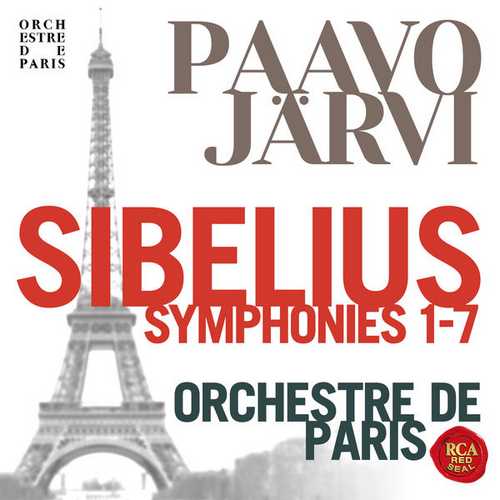

Composer: Jean Sibelius
Orchestra: Orchestre de Paris
Conductor: Paavo Järvi
Number of Discs: 3
Format: FLAC (tracks)
Label: RCA
Catalogue: 19075924512
Release: 2019
Size: 4.38 GB
Recovery: +3%
Scan: yes
CD 01
Symphony No. 1 in E minor, Op. 39
01. I. Andante, ma non troppo – Allegro energico
02. II. Andante (ma non troppo lento)
03. III. Scherzo. Allegro
04. IV. Finale (Quasi una fantasia). Andante – Allegro molto
Symphony No. 4 in A minor, Op. 63
05. I. Tempo molto moderato, quasi adagio
06. II. Allegro molto vivace – Doppio piu lento
07. III. Il tempo largo
08. IV. Allegro
CD 02
Symphony No. 2 in D major, Op. 43
01. I. Allegretto
02. II. Tempo Andante, ma rubato
03. III. Vivacissimo (- attacca -)
04. IV. Finale. Allegro moderato
Symphony No. 5 in E flat major, Op. 82
05. I. Tempo molto moderato – Allegro moderato – Presto
06. II. Andante mosso, quasi allegretto – Tranquillo
07. III. Allegro molto – Misterioso – Largamente assai
CD 03
Symphony No. 3 in C major, Op. 52
01. I. Allegro moderato
02. II. Andantino con moto, quasi allegretto – Tempo I
03. III. Moderato – Allegro (ma non tanto) – Sempre energico
Symphony No. 6 in D minor, Op. 104
04. I. Allegro molto moderato
05. II. Allegretto moderato
06. III. Poco vivace
07. IV. Allegro molto
Symphony No. 7 in C major, Op. 105
08. Adagio –
09. Vivacissimo (J)-
10. 14 bars before Adagio (L)
11. Allegro molto moderato – Allegro moderato –
12. Vivace – Presto – Adagio
Estonian conductor Paavo Järvi has recorded a lot of Sibelius: there are at least a couple of complete symphony sets as well as single recordings. In general, he has tended toward the abstract, toward the view that Sibelius, despite his adherence to tonality, was essentially a modern composer with a unique conception of form on both the small and large scales. Consider the finale of the Symphony No. 5 in E flat major, Op. 82, with its popular half-note theme of open fifths and sixths. It’s been thought to evoke anything from Thor’s hammer to swans taking flight, but here the epic quality of the motif is toned down, and what emerges instead is the depth to which the fifths and sixths are all over this finale. Järvi’s recordings of all three of the final symphonies are masterful, and the one-movement Symphony No. 7 in C major, Op. 105 unfolds with an organic inevitability that’s mysterious and miraculous. Perhaps Järvi’s approach is a little less desirable in the Symphony No. 1 in E minor, Op. 39, a genuinely Tchaikovskian work that is a bit drained of sentiment here, or in the Symphony No. 4 in A minor, Op. 63, which lacks the requisite gloom in this darkest of all symphonies. But the Second and Third symphonies have sweeping power, and the Orchestre de Paris is precise and sharp throughout. The Eiffel Tower on the cover does not exactly say Sibelius, but Järvi conducted this orchestra for several years, and it responds to his every wish. Your mileage may vary, for these readings are toward one extreme in the interpretation of Sibelius, but many will find the last three symphonies to be capstones of Järvi’s Sibelius career — unless he returns to Sibelius again.